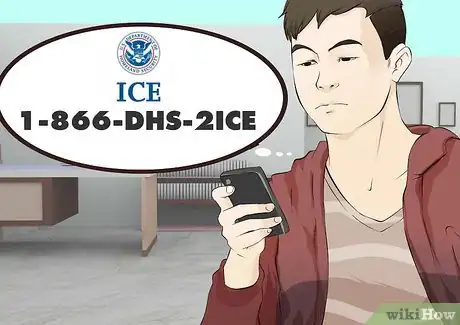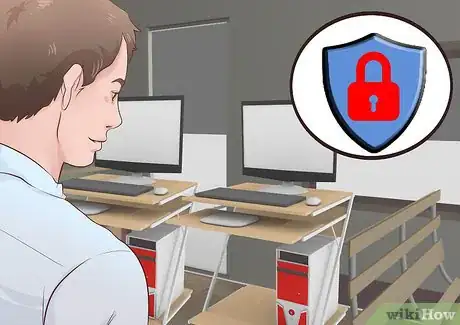This article was co-authored by Clinton M. Sandvick, JD, PhD. Clinton M. Sandvick worked as a civil litigator in California for over 7 years. He received his JD from the University of Wisconsin-Madison in 1998 and his PhD in American History from the University of Oregon in 2013.
There are 8 references cited in this article, which can be found at the bottom of the page.
This article has been viewed 23,076 times.
You should report online sex crimes immediately to the police. Over the last decade or so, more and more predators have begun to use the Internet, in order to meet minors for sex as well as to distribute or download child pornography. If you suspect that someone has committed an online sex crime, then you should call your local police and report your suspicions. The police will then investigate.
Steps
Identifying Online Sex Crimes
-
1Identify online sex crimes. People can use the Internet to commit different sex crimes. The most common online sex crimes include:[1]
- Using the Internet to distribute child pornography.
- Using the Internet to download or otherwise view child pornography.
- Using the Internet to contact minors for sex.
- Sending obscene material to someone under the age of 16.
-
2Write down who has committed the crime. You want to have enough information to report to the authorities so that they can investigate and arrest the person committing the online sex crime. As soon as possible, sit down and write out identifying details:
- The person’s name and address.
- The person’s online screen name, if they use social networking (Twitter, Facebook, Myspace) to meet minors.
- Why you think the person is committing an online sex crime.
Advertisement -
3Identify if you are an Electronic Communication Service Provider (ESP). Federal law requires that ESPs report suspected or known child pornography to the CyberTipline operated by the National Center for Missing and Exploited Children.[2]
- You qualify as an ESP if you provide remote computing services or electronic communication services across state lines or internationally in foreign commerce.
- You should have already registered your business with the National Center for Missing and Exploited Children (NCMEC). If your company has not, then you should contact NCMEC at espteam@ncmec.org and provide your company’s name, phone number, and email address.
-
4Don’t copy images. Although you want to preserve evidence of a crime, you don’t want to copy any pornographic images, since copying is itself a crime. Only print off images or make digital copies if you are instructed to do so by law enforcement.[3]
- Otherwise, you should keep the computer turned off. Doing so will help preserve evidence for law enforcement.
Reporting Online Sex Crimes
-
1Contact local law enforcement. You can begin reporting online sex crimes by contacting your local law enforcement.[4] Look in your phone book for the telephone number. Call and tell law enforcement who you suspect of online sex crimes and why.
- You should think about giving your name, even if you are allowed to report anonymously. By giving your name, you could provide critical testimony against the predator should the state bring a prosecution.
-
2Contact the Cyber Crimes Center (CCC). In the United States, Immigration and Customs Enforcement has created the Cyber Crimes Center which collects tips regarding child exploitation, including sex crimes. A unit within the CCC investigates the production and trade of child pornography around the globe.
- You can send tips by calling the hotline at 1-866-DHS-2ICE. This hotline is available around the clock.[5]
-
3Make a CyberTipline report. If you are an ESP, then federal law requires that you report suspected child pornography to the CyberTipline website. At the website, you should click on the “Make a CyberTipline Report.” Your report should contain the following information:[6]
- Information about the identity of anyone who may have violated the law.
- The geographic location of the individual or the website involved, which may include a verified billing address or the web address.
- The day and time the customer uploaded, transmitted, or received the apparent child pornography, or when and how you discovered it. You should include a time and date stamp on this information.
- Any images of apparent child pornography.
- The complete communication containing the image of apparent child pornography, including attached digital files.
Protecting Your Children from Predators
-
1Notice warning signs. Teens today spend considerable amounts of time online. For this reason, they are vulnerable to being contacted by a sexual predator. You should look for the following signs that your child may be communicating with a predator:[7]
- Your child spends large amounts of time online at night. Because most predators work during the day, they usually contact children at night. Although most teens spend a lot of time online, your child may be vulnerable if they spend an unusual amount of time online at night. Also pay attention to whether your child is withdrawing from family or friends. This could be a sign that they are in contact with a predator.
- Your child is secretive about his or her online activities. For example, your child might turn the computer screen off when you enter the room or not want to tell you what they are doing online, or your child does tell you but acts agitated, pauses a lot, or shows other signs that they're making stuff up.
- Your child receives phone calls from unknown numbers. This could be a sign that your child has connected with a predator online and the predator is now trying to talk over the phone.
- Your child is downloading pornography over the Internet. Predators often connect with children by sending them pornography as a way to begin talking about sex.
- Your child uses an online account that belongs to a different person.
-
2Warn your children about the dangers of online communication. Just as you warned your children to be careful of talking to strangers in public, you should also warn them about talking to strangers online. Let them know that they should come talk to you if a stranger contacts them through social media or email.
- Also tell your children never to give out identifying information online, such as where they live or their telephone number.[8]
- Explain to your children that any pictures they post could contain identifying information. For example, a predator can identify where your child lives by looking at the background of pictures they post and finding recognizable landmarks or businesses.
-
3Install blocking software. You can buy software on the market that blocks your children from visiting certain websites.[9] You can install it onto the family computer. There are many software programs available, so search for “blocking software” in your favorite search engine.
- You should realize that this kind of filtering software is often easy to bypass. For this reason, you should also install Internet Monitoring Technology so that you can check what websites your child visits.
-
4Check what Internet sites your child visits. You can also monitor your child’s Internet and smartphone activity by purchasing Internet Monitoring Technology. There are many different apps available. You should do an online search to find the best technology for you. Some of the more popular include:
- Web Watcher. You can install this on a computer or phone, where it remains undetected. All activity is collected and then sent to an account you can access from any computer.[10]
- Teen Safe. With this technology, you can view texts, call logs of incoming and outgoing calls, and view Instagram. There is a free trial period.
-
5Find out what safeguards are installed on school computers. Your children could meet predators using a school or public library computer. You should find out what safeguards are installed on these computers.[11]
-
6Keep the family computer out in the open. If you have a family computer, then you should think about keeping it on a table in the middle of a room. In this way, it is harder for your child to engage in secretive behavior on the computer since people passing by can see the screen.[12]
- Of course, as an adult, you may like some privacy when you go online yourself. In this situation, you could use a laptop for your own web surfing but only let your children use the family computer in plain view.
References
- ↑ http://www.smart.gov/SOMAPI/sec1/ch4_internet.html
- ↑ https://www.law.cornell.edu/uscode/text/18/2258A
- ↑ https://www.fbi.gov/stats-services/publications/parent-guide
- ↑ https://www.fbi.gov/stats-services/publications/parent-guide
- ↑ https://www.ice.gov/predator
- ↑ https://www.law.cornell.edu/uscode/text/18/2258A
- ↑ https://www.fbi.gov/stats-services/publications/parent-guide
- ↑ https://www.fbi.gov/stats-services/publications/parent-guide
- ↑ https://www.fbi.gov/stats-services/publications/parent-guide








































































